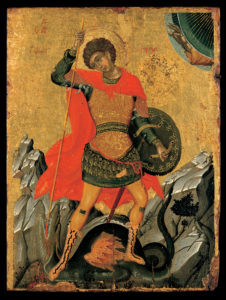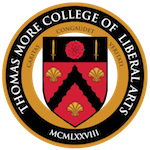“The dragon sits by the side of the road, watching those who pass. Beware lest he devour you. We go to the Father of Souls, but it is necessary to pass by the dragon.”
—St. Cyril of Jerusalem
Today is the Feast of St. George, martyr for the Faith and Patron Saint of England and Palestine. The Red Cross Knight of Spenser’s Faerie Queene bears the saint’s heraldic image, as does Sir Galahad of Malory’s Morte D’Arthur and, in real life, the Crusaders before them. In the Holy Land, there are countless churches dedicated to Al-Khadr (“the green one”), and the Arabic cry of “Ya Khadr” is a frequent invocation of the Saint’s intercessory help in times of distress.
We are all familiar with the legendary tale in which St. George saves the maiden from the dragon. It is commemorated in the most popular iconographic image of this valiant saint, who was martyred, as Jacobus de Voragine, a thirteenth-century Dominican, tells us in his lively book of saints’ lives known as the legenda aurea or The Golden Legend, during the reign of the Roman Emperor Diocletian. The Golden Legend exists in nearly 1000 manuscripts, making it arguably as popular in the Middle Ages as the Bible itself, if not more so. In his life of St. George, pious accounts of Church Fathers—Jacobus cites both St. Ambrose and Gregory of Tours—mingle comfortably alongside outrageous legendary stories, stories which our compiler openly acknowledges as apocryphal.
Jacobus commences his account of St. George with one of his characteristically fanciful and inventive etymologies. (Though obviously skilled in Latin, he had, to paraphrase what Ben Jonson once famously said of Shakespeare, “small Greek, and less Hebrew.”) He first establishes the true Greek etymology of George: “derived from geos, meaning earth, and orge, meaning to work; hence, one who works the earth, namely, his own flesh.” He then moves into a kind of free association exercise, positing a series of alternate etymologies:
Or George is derived from gerar, holy, and gyon, sand, therefore, holy sand; for he was like sand heavy with the weight of his virtues, small by humility, and dry of the lusts of the flesh. Or again, the name comes from gerar, holy, and gyon, struggle; so a holy fighter because he fought against the dragon and the executioner. Or George comes from gero, pilgrim, gir, cut off, and ys, counselor, for he was a pilgrim in his contempt for the world, cut off by gaining the crown of martyrdom, and a counselor in the preaching of the Kingdom.
Jacobus must surely recognize that these are not linguistically legitimate derivations. But as with his use of legendary sources, that is really beside the point: these etymologies are “true” to the extent that they allow us to enter more deeply into the humility, courage, and wisdom of this great saint.
When Jacobus recounts the legend of St. George and the dragon, his storytelling gets the better of him. He begins by telling us how the young warrior encounters a maiden in tears by the edge of a lake and asks her why she weeps. “She answered: ‘Good youth, mount your horse quickly and flee, or you will die as I am to die.’ George responded: ‘Lady, fear not; but tell me, what are all these people waiting to see?’” Then Jacobus dispenses with the usual “he said”/”she said” introductions for dialogue, morphing as he often does in the legenda into a tense, fast-paced exchange, one that reads more like a enacted drama than a narrative:
The damsel: ‘I see, good youth, that you have a great heart, but do you want to die with me? Get away speedily!’
George: ‘I will not leave here until you tell me the reason for this.’
The maiden explains her situation, to which George replies: “Don’t be afraid child! I am going to help you in the name of Christ!”
With these stirring words, St. George speaks not only to the maiden, not only to readers of the legenda, but to all those in need, and in a very specific way, to us. For in a particularly revelatory moment, Jacobus tells us that the dragon assailing the people of Silena was a “plague-bearing dragon,” who would “poison everyone who came within reach of his breath.”
So, too, I suggest, our present pestilence, this COVID-19 pandemic, has been accompanied by not one, but many plague-bearing dragons, lying in wait to devour us. Yet these dragons are more subtle and wily than St. George’s dragon, for they are of a different nature: they are hidden, unseen, and largely within us.
I speak of the dragon of laziness, the dragon of fear, the dragon of distraction, the dragon of self-pity, the dragon of discouragement.
We have all fought valiantly against these dragons over the past several weeks, as we endure this protracted time of “self-isolation,” “social distancing,” and “remote learning.” Horrid terms, and so antithetical to the spirit of communitas that informs all we do at Thomas More College! We are all doing our best, but we need to be honest about the struggles we daily undertake with these dragons that seek to overwhelm us with anxiety, loneliness, and despair. “Ya Khadr!” we must cry out.
How do we do battle with these dragons? I am reminded of a humble figure who, like our valiant saint, also was called to confront his dragon. This dragon describes himself in terms calculated to instill fear and trembling: “My armour is like tenfold shields, my teeth are swords, my claws spears, the shock of my tail is a thunderbolt, my wings a hurricane, and my breath death!” He tells us he is an ancient dragon, whose strength has grown with time: “I kill where I wish and none dare resist. I laid low the warriors of old and their like is not in the world today. Then I was but young and tender. Now I am old and strong, strong, strong.”
When Bilbo Baggins finally comes upon Smaug (for he is the dragon, and Tolkien’s The Hobbit the scene of this great encounter), he is momentarily paralyzed with fear. Tolkien describes the sound of the dragon as “a sort of bubbling like the noise of a large pot galloping on the fire, mixed with a rumble as of a gigantic tom-cat purring.” This noise grows “to the unmistakable gurgling noise of some vast animal snoring in its sleep down there in the red glow in front of him. It was at this point,” the narrator tells us, “that Bilbo stopped.”
Bilbo stops. But Bilbo finds the resources within to confront the dragon. “Going on from there,” the narrator tells us, “was the hardest thing he ever did.”
In the coming days and weeks, many of you—especially the Seniors, who have had to forego so much in the midst of so much uncertainty—will feel that overcoming your dragons is the hardest thing you have ever have done. I suspect you may well be right. But as Tolkien reminds us, “even dragons have their ending.” This too shall pass.
In the meantime, we are all called to “pass by the dragon,” rather than attempt to avoid him. It would actually be more straightforward, satisfying—and, arguably, much easier—if the dragons we were called to battle were real, external, flesh-and-blood monsters with fiery breath and hideous green scales. But in this disembodied age, the dragons that assail us are complex, hidden and internal. Still, we cannot ignore or bypass this great “adventure” God is calling us to, the sufferings He is asking us to endure.
And remember, we do not confront these dragons alone. We are all supporting one another with prayer and sacrifice. Our patron, St. Thomas More—whose earthly sufferings make ours look puny and negligible by comparison—waits upon our intercession. So, too, does the glorious martyr Saint George. “Don’t be afraid child! I am going to help you in the name of Christ!” If we wish to go to the Father of Souls, we must first confront the dragon.
O St. George, Faithful servant of God and invincible martyr, favored by God with the gift of faith, and inflamed with an ardent love of Christ, thou didst fight valiantly against the dragon of pride, falsehood, and deceit. Neither pain nor torture, sword nor death could part thee from the love of Christ. We fervently implore thee for the sake of this love to help us by thy intercession to overcome the temptations that surround us, and to bear bravely the trials that oppress us, so that we may patiently carry the cross which is placed upon us; and let neither distress nor difficulties separate us from the love of Our Lord Jesus Christ.
For further reading:
President Fahey Gives Video Address about TMC and COVID-19 Crisis
 By
By 